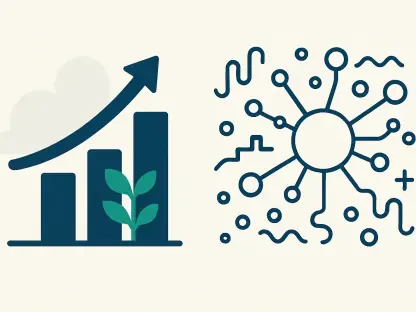The agricultural sector within the European Union is encountering unprecedented financial challenges as climate change exacerbates the frequency and intensity of extreme weather events. Recent findings from a joint report by the European Investment Bank (EIB) and the European Commission highlight the critical financial burden faced by farmers due to climate-induced disruptions. As the sector grapples with annual losses averaging €28 billion, projections suggest these could skyrocket to over €40 billion per year by 2050 if current emission trajectories remain unaltered. The report underscores a potential 66% increase in EU agricultural losses by mid-century, painting a dire picture of the future if preventive measures are not instituted swiftly. It calls for robust risk-management frameworks to cushion farmers against these climatic shocks, emphasizing a stable food supply and the protection of agricultural investments.
The Growing Need for Enhanced Insurance Coverage
The report reveals stark gaps in existing insurance coverage, noting that only 20% to 30% of climate-related agricultural losses are insured through current systems. Despite the support embedded in the Common Agricultural Policy (CAP), numerous farmers lack sufficient coverage against environmental risks. The findings advocate for expanding insurance options as a more effective strategy than merely relying on government compensation schemes. This expansion is seen as essential in buffering the agricultural economy against potential financial shocks, which are becoming increasingly frequent and severe. The inadequacy in current risk management measures points to an urgent need for more comprehensive and accessible insurance solutions that can shield farmers from the volatility characteristic of today’s climate.
While some progress has been made, the report emphasizes the necessity for a more extensive array of financial instruments. The availability of innovative solutions like catastrophe bonds and public-private reinsurance is highlighted as a vital step toward enhancing climate resilience in the agriculture sector. Encouraging EU member states to integrate these strategies within their CAP Strategic Plans could offer more substantial protections for farmers. There is also a call to explore rapid-response funding mechanisms, which can provide the immediate liquidity needed after destructive climate events. The foresight of incorporating such instruments anticipates the pressing need for novel financial management approaches tailored to the unique dimensions of farming in the modern era.
Recommendations for Financial and Strategic Improvements
Apart from broadening insurance coverage, increasing the availability of loans, guarantees, and equity investments is critical for fostering financial resilience in agricultural communities. The EIB is urged to play a more active role, notably through enhancing access to rural infrastructure financing. Such measures not only safeguard the industry but also enhance its overall capability to withstand environmental uncertainties. Embracing EU-backed guarantees and blended finance strategies can mobilize private sector investments, thereby providing crucial support for agricultural climate adaptation initiatives. Moreover, these efforts aim to ease the burden on conventional financing options, opening up alternative pathways for capital access that are becoming increasingly essential due to climate change pressures.
There’s an emphasis on innovating within the financial systems, encouraging the deployment of grants and similar funding mechanisms to attract additional resources. As banks potentially adopt more risk-averse policies amid expanding climate-related threats, creating incentives for private investment becomes even more vital. Ensuring that available funding efficiently addresses the evolving challenges farmers face can mitigate some of the immediate fiscal pressures. The report continues to warn that leaving losses underinsured could stifle the resilience needed for the sector to thrive amid the climate transition phase, risking long-term ramifications for the industry and associated communities.
Mobilizing Public and Private Support
Harnessing both public and private capital is pivotal in fortifying long-term resilience in the agricultural sector against the backdrop of intensifying climate change impacts. The report stresses that without concerted efforts to infuse capital into innovative adaptation measures, many farmers could face difficulty accessing necessary funds to sustain operations. This situation could be compounded by an increasingly cautious banking sector hesitant to invest amid uncertain climate futures. Therefore, utilizing grants and other public financing options to spur additional investments is strongly recommended. These actions should aim to distribute financial risk more evenly and ensure broader, sustained support for the agricultural community.
Moreover, public-private partnerships are a cornerstone of building a more resilient financial framework. Leveraging these collaborations can provide the agricultural sector with enhanced stability and flexibility to adapt to ongoing climate disruptions. By aligning economic incentives between various stakeholders, these initiatives can help to pool resources, share risks, and ensure a coherent response mechanism is in place for crisis management. Such arrangements are seen as imperative in helping to cover the uninsured losses that persist across the European Union, making it possible to maintain agriculture’s vitality in a drastically changing climate.
A Path Forward for Enhanced Agricultural Resilience
The report highlights significant gaps in current insurance coverages, revealing that only 20% to 30% of climate-induced agricultural losses are insured. Despite support from the Common Agricultural Policy (CAP), many farmers remain inadequately protected against environmental risks. The report advocates for broader insurance options, deemed more effective than solely relying on government compensatory schemes. This expansion is crucial for shielding the agricultural economy from intensifying financial shocks caused by climate change. The current risk management strategies fall short, underscoring the urgent need for comprehensive and more accessible insurance solutions to protect farmers from climate volatility.
Progress has been made, yet the report stresses the need for a wider range of financial instruments. Innovative solutions such as catastrophe bonds and public-private reinsurance are vital for strengthening climate resilience in agriculture. Encouraging EU states to incorporate these strategies into CAP Strategic Plans can provide farmers with more robust protection. The report also calls for rapid-response funding mechanisms to ensure immediate liquidity after devastating climate events. Anticipating these needs, these tools are essential for modern financial management tailored to farming’s unique challenges.









